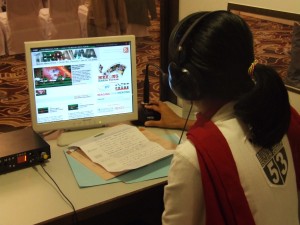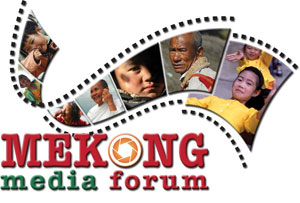By Joel Chong
CHIANG MAI, Thailand (TerraViva) – No, it’s not that odd buzzing in your ears you get from sleeping with your earphones on. Perched like small chickens in little grey booths are the Mekong Media Forum’s tireless translators stringing out sentences faster than you can say ‘What did he say?’
Perched like small chickens in little grey booths are the Mekong Media Forum’s tireless translators stringing out sentences faster than you can say ‘What did he say?’
“Sometimes, when they (participants) start talking, they don’t really remember there are six other languages working in the background (catching up),” said Lin Zixin, our Mandarin translator from Singapore.
Lawyers, TV news anchors, graphic designers and paper company executives are probably not the first things that come to mind when you think of translators but our quick-witted MMF translators aren’t the usual suspects.
Martin, another Mandarin translator, works in Bangkok at Double A (the ubiquitous blue/turquoise packaged copier paper) as a marketing/IT executive while Tou, our Lao translator, designed the MMF logo.
So how did they end up translating for MMF, and before that the Imaging Our Mekong fellowships run by IPS Asia-Pacific and Probe Media Foundation?
“Ah, tough question!” laughed Tou. “I know Kino (the MMF coordinator), and Kino used to be the fellow here and she went to the Philippines (for training), “ referring to Imaging Our Mekong programme. He was since introduced to IPS and Probe and has since translated for Imaging Our Mekong workshops.
“At first I didn’t realise that it was a job I would end up doing, because I always I don’t usually talk too and drawing or designing… but so far it’s been good,” he added.
Sometimes, it’s not just the rapid-fire words from the speakers that our translators have to dodge, but the neighbour next to them who provide too much ‘ambience sound’.
“If we have a very soundproof booth, it would not be difficult,” mused Mike, our Vietnamese translator. “But it’s quite challenging when we work in the room without the booths (such as in the Lanna Room) because our voice will interfere with another voice and we have to shout, not speak any more, to compete with other voices, so my throat is sore right now. . . though the shouting does relief the stress,” he joked.
“You’ll see us covering our ears to prevent disruption, and basically that works!” added Tou.
Occasionally the relay from non-English speakers comes with the added challenge of finding context from their fellow interpreter’s translations. “Simultaneous interpreting by itself is very already challenging… but with six different languages you’re not only listening to the speaker on the floor but you have to listen to a relay from the fellow interpreter and that’s very challenging,” said Pu, our Thai translator.
While some might think that being paid to talk endlessly might be a dream job, Mee, the other Thai translator and also a full-time professional translator, will let you know that much research goes into plan before arriving on the job.
“Preparation is the most important thing… before taking a job you have to study and come up with a glossary,” she said, when asked about understanding technical terms being used in the conference. “We usually ask for any slides, presentations or anything that can help us,” she added.
Translating might even bring with it a thing or two to think about.
“I feel somehow that it’s related to my job as a reporter and as a translator. Being a translator, I want to listen to how people view media so that I can learn something,” said Thuy, our Vietnamese translator who is also a television reporter.
“Coming here, learning about all of these things, meeting different people, hearing different opinions, it has been very beneficial for me,” said Sophy, our Khmer translator and an aspiring author. “I’ve been able to learn new things in my career it has been a blessing.”
The other translators in the group are Mon, a former Imaging Our Mekong fellow, and Ronald, both of who translate into Burmese, Pui from Lao PDR and Yin Soeum from Cambodia.







